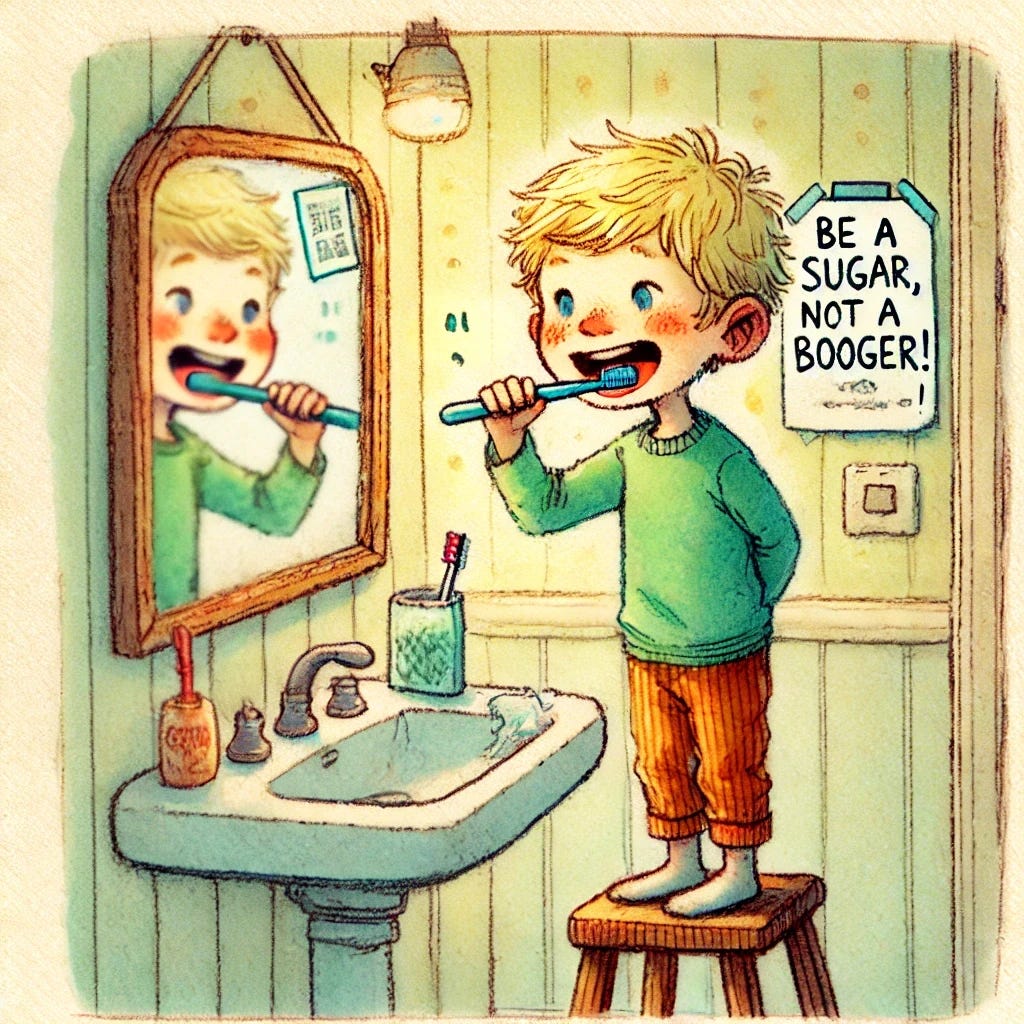"Be a Sugar, Not a Booger": Stoic Parenting in Action
Justice, courage, discipline, and wisdom—teaching kids the four cardinal virtues through everyday lessons.
"Be a sugar, not a booger!"
I'm not sure where exactly it came from, but I remember first using it about a year ago as I unbuckled my son from his car seat to drop him off at daycare.
"Remember, buddy, be a sugar, not a booger!"
"Not a booger!" he replied, likely more as mimicry than understanding. But the saying has stuck, becoming a mantra in our house.
Since that day, the phrase has evolved into a simple way to introduce the concept of justice to our kids. Justice is a weighty idea, difficult for young children to grasp, and it'll probably be years before they truly understand it. But planting this mantra in their heads is a start.
We have a few other mantras, too. "You can do hard things!" encourages perseverance. "What do we do when we fall? We get back up!" instills resilience. And lately, as my son plunges deep into his "why" phase, we respond to each "why" with "Why do you think [blank]?" Not as a dismissal—we ask it with genuine curiosity, hoping to cultivate his own inquisitiveness and belief that he can find answers himself. Someday, when he's ready, we hope he'll use that curiosity to seek truth and wisdom about himself and the world.
Justice, courage, discipline, and wisdom are known as the four cardinal virtues. Many people learn about them through religious teachings, but they also form the foundation of Stoic philosophy—principles I've tried to live by and that my wife and I now weave into our parenting.
If you're unfamiliar with Stoicism, you might think it’s about suppressing emotions and maintaining a cold, poker-faced existence. But that’s a misconception. Stoicism’s actual stance on emotions is summed up well in a meme I saw recently:
Ancient Stoics never advocated for emotional suppression. They felt emotions deeply—even allowed themselves to cry. But they believed that while you can’t control what you feel, you can control how you respond. As long as you don’t let emotions "drive the car"—leading you to act against your values—you’re practicing Stoicism. This approach to emotional regulation heavily influenced Cognitive Behavioral Therapy, one of the most widely used techniques for managing anxiety, depression, and other mental health challenges today.
The Stoics applied this perspective not just to emotions, but to all aspects of life. They emphasized recognizing what is within our control and what isn’t—so we don’t waste energy on the uncontrollable and instead focus on the one thing we can control: our response.
Stoic philosopher Epictetus summed it up well:
“Some things are up to us, and some things are not up to us. If you seek to avoid illness or death, or to have power and wealth, you will be frustrated and miserable. But if you confine yourself to what is truly yours—your own mind and will—you will be free.”
This idea, known as the dichotomy of control, is central to Stoic teaching. It also underpins the four virtues: You need wisdom to discern what is in your control, the discipline to manage your reactions, a sense of justice to know right from wrong, and the courage to act accordingly.
So what does all this have to do with parenting?
Going back to our family mantras, we try to instill these virtues in our children in simple, practical ways. "Be a sugar, not a booger" is a very simple view of justice, not only in the sense of obeying laws, but also as a general way of governing how we treat others. For the Stoics, justice was practical, not abstract. They often spoke and wrote of acting for the common good.
"What is good for the hive is good for the bee," Marcus Aurelius wrote in his journal, which today is known as Meditations1, and consists of hundreds of reminders he wrote to himself to help remind him to let the principles of Stoicism dictate his actions.
In the coming days, we'll explore more ways to integrate Stoic teachings into parenting. There are many paths to instilling virtue in children, and while no single approach is perfect, Stoicism offers practical, digestible lessons that fit naturally into everyday life. But just as we emphasized with mindful parenting—parents set the tone. Kids will mimic what they see more than what they hear. So, one of my favorite Stoic reminders from Epictetus applies here:
"Don't explain your philosophy. Embody it."
Affiliate Disclaimer
Paternal Progress participates in the Bookshop.org affiliate program. This means that when you purchase books through the links on this page, I may receive a small commission of 10 percent from each sale. This helps support the work I do at Paternal Progress, without any extra cost to you. I only recommend books I genuinely believe will benefit you and your family. Thank you for supporting my site and local bookstores!



